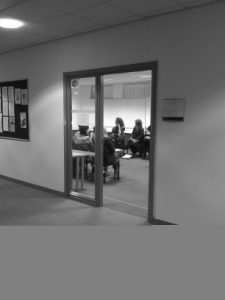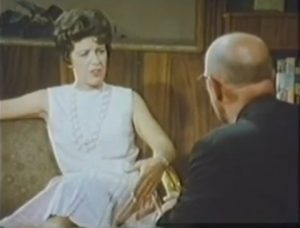I mentioned back in October that I’ve returned to education and am now studying counselling, part-time. I thought I’d share with you an update on how that’s going.

The short answer: it’s going well.
I’m finding myself challenged in fun and new ways, despite my volunteering experience, which has included no small amount of work on emotional support helplines of one kind of another. For example, we’ve on two occasions now done role-play sessions in which the “helper” (the person acting in the role of a counsellor) has been required to not ask any questions to the “helpee” (their client). Depending on your theoretical orientation and your background, that’s either a moderately challenging or a very challenging thing – sort of like the opposite of a game of Questions, but with the added challenge that you’re trying to pay attention to what the other participant is actually saying, rather than thinking “Don’t ask a question; don’t ask a question; don’t ask a question…” the whole damn time.
It’s an enjoyable exercise, and works really well to help focus on sometimes-underused skills like paraphrasing and summarising, as well as of course giving you plenty of opportunity to simply listen, attend to the helpee, and practice your empathic response. The first time I did it I was noticed (by my observer) to be visibly uncomfortable, almost “itching to ask something”, but by the second occasion, I’d cracked it. It’s like climbing with one arm tied behind your back! But as you’d expect of such an exercise, it leaves you with far more care, and control… and one enormous muscular arm!
Amidst all of the “fluffy” assessment, I was pleased this semester to be able to cut my teeth on some theoretical stuff, as a break. The practical side is good, but I do enjoy the chance to get deep into some theory once in a while, and my reading list has spiraled out of control as each thing I read leads me to find two other titles that I’d probably enjoy getting into next. I’ve recently been reading Living with ‘The Gloria Films’: A Daughter’s Memory, by Pamela J Burry, whose existence in itself takes a little explanation:

In 1964, three psychotherapists walked into a bar. They were Carl Rogers, Albert Ellis and Fritz Perls. They had a few drinks, and then they had an argument about whose approach to psychotherapy was the best.
“I respect you both deeply,” began Perls, “But surely it is clear to see that your rejection of Gestalt therapy is rooted in your attempts to pretend to be accepting of it. It is clearly the superior approach.”
“You don’t need to get emotional over this,” said Ellis, “Let’s just go back and find the event that first inspired your prejudice against my rational emotive therapy, and re-examine it: there should be no doubt that it is the best way to treat disorders.”
“It feels like you’re being quite cold to one another,” said Rogers, father of the humanistic approach, after a moment’s pause. “I wonder what we could do to explore this disagreement that we’re having… and perhaps come to an answer that feels right to us all?”
And so the three agreed to a test: they would find a subject who was willing to undergo a single therapy session from all three of them, and then it’d be clear who was the winner. They’d film the whole thing, to make sure that there could be no denying the relative successes of each approach. And the losers would each pay for all of the winner’s drinks the next time they went out to the Rat And Bang, their local pub.

Now that story is complete bullshit, but it’s far more-amusing than any true explanation as to why these three leading counsellors were filmed, each in turn, talking to a client by the name of Gloria – a 30-year-old divorced mother of three concerned with being a good parent and how she presents herself to men. I’ll leave you to find and watch the films for yourself if you want: they’re all available on video sharing sites around the web, and I’d particularly recommend Carl Rogers’ videos if you’re looking for something that almost everybody will find quite watchable.
Gloria died fifteen years later, but her daughter “Pammy” (whose question about sex, when she was nine years old, gave so much material to Gloria’s session with Carl Rogers) wrote a biography of their lives together, which was published in 2008. The focus of “The Gloria Films” was on the therapeutic methodologies of the practitioners, of course. But Gloria herself was intelligent and compelling, and I was genuinely interested to get “the rest of the story” after she left that film studio (made up to look like a psychotherapist’s office) and got on with her life.
Hence the book.
And so hence, my example of how I keep reading (or in this case watching) things, which lead me to find more things to read, which in turn give me yet more things to read.
And now you’re up-to-date.